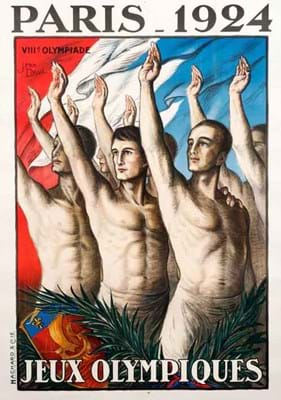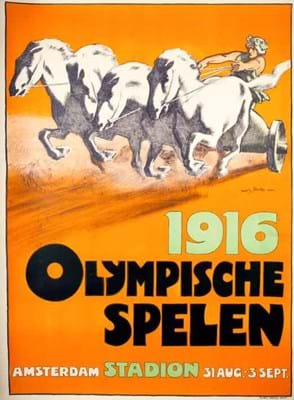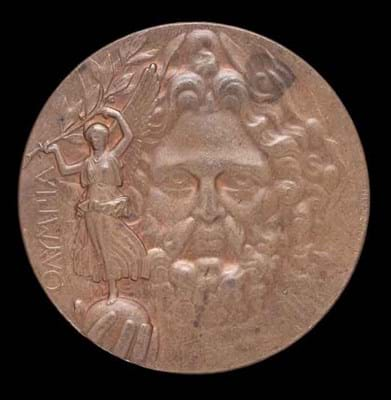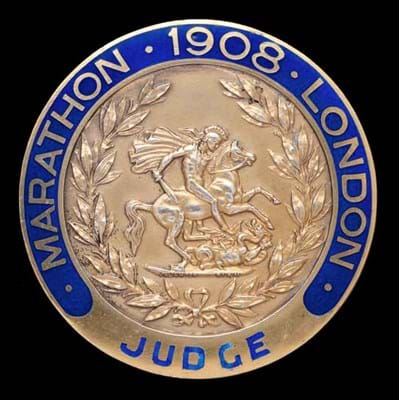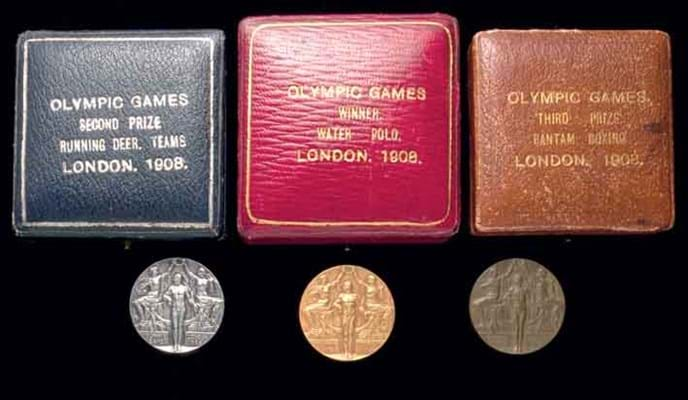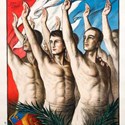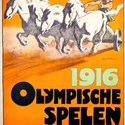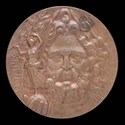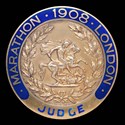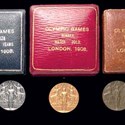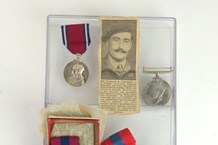Firms were understandably keen to capitalise on the opportunity presented by such a mega-event, including two London auctioneers who mounted specialist sales of Olympic memorabilia in the immediate run-up to the Games.
Graham Budd (17.5% buyer's premium)offered 601 lots in association with Sotheby's at their New Bond Street saleroom on July 24 and Bonhams (25/20/12% buyer's premium) put another 216 lots under the hammer in their Knightsbridge rooms the next day.
At the Graham Budd sale, demand was strongest for the rarer items dating from the 1896-1924 period, with the strongest results for medals, although posters also proved popular.
London 1908 was understandably popular, but other early Games items attracted high interest.
From the 1928 Amsterdam event onwards there was increasing commercialisation of the Games so many items from later Olympics are more common and produced in larger numbers.
The earliest lots in Mr Budd's sale related to the inaugural revived event in 1896. They included the first three issues of Pierre de Coubertin's (founder of the modern Olympic movement) original publication Bullétin du ComitéInternational des Jeux Olympiques 1894/95 (today known as the Olympic Review). Described as "scarce", it made a low-estimate £6000.
An 1896 Athens silver medal fetched £15,000 (estimate £15,000-18,000). No gold medals were actually awarded at this first Games - winners were given a silver medal. Christie's have another one of these in their September 3 London Sale, estimated at £20,000-30,000. It was supposed to be given to the winner of the boat race but was never presented after rough seas and strong winds meant the event was cancelled.
First London Games
The 1908 items really got the sale going, with interest high considering it was the first of the three Games to be held in London and the sale was held to coincide with the third version. Vendors who had maybe retained items in the family for many years were tempted to consign.
The Olympics were held in White City, West London, after the Italians said they could not afford to hold it in Rome following the 1906 Naples earthquake. Just 22 countries took part in London and Great Britain took 56 gold, 51 silver and 38 bronze medals - a haul surely never to be repeated.
A very rare opportunity came up on July 24 to buy a complete set of cased gold, silver and bronze medals all awarded to GB competitors and proved to be the stand-out lot. They were designed by Bertrand Mackennal and produced by Vaughan of Birmingham. The gold went to Charles Sydney Smith for water polo, the bronze to bantamweight boxer William 'Wally' Webb, but the silver was for the GB team in the intriguing 'team single shot running deer' competition - which featured, as you may have guessed, a deer-shaped target making ten runs of 75ft lasting about four seconds. The set made £17,000 against an estimate of £15,000-20,000.
A collection of memorabilia featuring a cased gold medal and winner's diploma for boxer Richard K. Gunn fetched £10,500, just above low estimate. Gunn holds the record as the oldest man to have been crowned as an Olympic boxing champion at the age of 37 years and 254 days. He had come out of retirement to take part (an 1896 retirement which was actually at the request of the ABA because he was far too dominant...).
Making £10,500 against an estimate of £8000-12,000, a 1908 gold medal awarded for rugby showed that antipodean dominance of the game is not a new phenomenon. The recipient was unknown. The touring Wallabies team provided the only real opposition to a GB side which was effectively the Cornwall county team, and won convincingly 32-3.
The badges worn by officials at the White City stadium are rare but have occasionally come up at auction and proved popular. The July 24 sale included a silver-plated and blue enamel marathon judge's badge which made a low-estimate £8000.
A marathon steward's badge went for £4200 at Special Auction Services near Newbury on September 1-2 last year.
The 1908 event was famously the occasion when the disorientated Dorando Pietri was disqualified after being helped when he collapsed close to the finish line, but was later given a silver-gilt cup by Queen Alexandra.
All the 1908 lots mentioned above went to overseas private buyers.
Along with the rarity value of the earlier Games, which of course means many items were the first ever awarded, as events were added to the roster - or taken away - and participants became the first to win particular events for their countries, there are also some remarkable stories adding to the appeal.
Stockholm Games
The background to a 1912 Stockholm gold medal reflects this, contributing to an £11,000 hammer price against an estimate of £4000-6000. It was awarded for the 100m freestyle relay to swimmer Jennie Fletcher - who had become Britain's first female Olympic swimming medallist when she took a bronze in the individual event.
Fletcher described swimming as her "greatest pleasure and no encouragement was needed for me to compete in polo, diving or swimming". A society where suffragettes were just starting to have an effect was not so eager, though, and she had to get special permission for her brother Ben to be allowed to pace her - there was no mixed swimming. In 1908, after much deliberation, it was decided that a competition for ladies could be held, but uncertainty and a late decision meant there were not enough entries and those events were cancelled.
Reinforcing the interest pre-1928 was a gold medal from the 1920 Antwerp Games in the original box of issue. A UK private buyer paid £11,000 to shatter the £2000-2500 estimate, even though the recipient is unknown. However, it is believed to have been in Britain since 1920, so is presumed to have been won by a British competitor. GB won 15 golds at Antwerp.
The 1912 and 1920 medals mentioned above went to overseas private buyers.
Posters
One poster sold for a low-estimate £4200, also to an overseas private buyer, was for a Games that never really took place: the 1916 Olympics, cancelled because of the First World War. A national Olympics was held in Amsterdam instead and although deemed unofficial, Pierre de Coubertin had declared: "If an Olympiad is not celebrated, its number remains", so it became known as the VIth Olympiad. Another poster for a Games suspended because of war, that of Helsinki in 1940, was sold for a low-estimate £2000.
An official poster for a Games that definitely took place, Paris 1924, featuring saluting athletes, made £7200 against a £2000-3000 estimate, bought by a UK private buyer.
As Mr Budd acknowledged, the later items did not have the same pull as the earlier Games. A 1936 Winter Olympic Games cased bronze medal and diploma presented to Guy Dugdale for the GB four-man bobsleigh, inscribed Garmisch-Partenkirchen, did go for £15,000 to an overseas private buyer but this was under estimate. GB won three medals at Garmisch-Partenkirchen, including, amazingly perhaps, gold in the ice hockey.
This was the first sale Mr Budd has held dedicated solely to the Games, although his regular sporting sales have featured many Olympic items.
The timing - held just days before the Olympic opening ceremony - boosted interest, although over half the lots failed to get away in the end. He said there was a very good, busy atmosphere in the room, with three TV crews joining the many international buyers from countries such as the US, Australia and China. With Bonhams holding their Olympic sale a day later many international buyers would have been in London, also ready to attend the Games perhaps, and many lots went to private buyers actually in the room.
"There were a lot of collectors who had previously not been on our radar, so that aspect was very pleasing," said Mr Budd.
The sale total was £314,630 hammer, with 262 (45%) lots sold.

